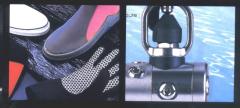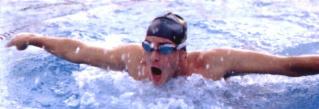Viruses and Sour Economies Don't Dampen Makers' Spirits
Water-sports Equipment
 Taiwan's
water-sports industry was not deeply affected by the Asian financial turmoil that
has been plaguing Asian region since the second half of 1997, because the industry
only exports 10% of overall production to Asian nations. Taiwan's production of
water-sports equipment is dominated by diving equipment and inflatable products.
With 17 manufacturing companies, Taiwan's diving-equipment industry only sells
about 6.5% of its output to Asian nations. Founded 29 years ago for the development
and production of diving equipment, Kama Corp. has seven sales agents in the Asian
region. Currently Asian market accounts for 17% of the company's total production.
"We were affected a little bit by the Asian financial crisis before the end of
last year, but we are happy to see that orders from Asian market over the last
two months are increasing," John W. Chang, president of Kama, says. Chang is also
the executive director of the Taiwan Sporting Goods Manufacturers Association. Taiwan's
water-sports industry was not deeply affected by the Asian financial turmoil that
has been plaguing Asian region since the second half of 1997, because the industry
only exports 10% of overall production to Asian nations. Taiwan's production of
water-sports equipment is dominated by diving equipment and inflatable products.
With 17 manufacturing companies, Taiwan's diving-equipment industry only sells
about 6.5% of its output to Asian nations. Founded 29 years ago for the development
and production of diving equipment, Kama Corp. has seven sales agents in the Asian
region. Currently Asian market accounts for 17% of the company's total production.
"We were affected a little bit by the Asian financial crisis before the end of
last year, but we are happy to see that orders from Asian market over the last
two months are increasing," John W. Chang, president of Kama, says. Chang is also
the executive director of the Taiwan Sporting Goods Manufacturers Association.
|
| Still, Chang is pessimistic about the development prospects of the domestic water-sports industry. Export statistics from TSMA show that the export value of the industry has been declining since 1995. The industry exported NT$47 million (US$1.56 million [US$1:NT$30]) worth of products in 1995 and shrank to NT$44 million (US$1.46 million) and NT$35 million (US$1.16 million), respectively, in 1996 and 1997. "Taiwan's manufacturers of diving equipment are facing fierce competition from France, Italy, mainland China, and Malaysia," Chang analyzes. "Moreover, there are some disadvantageous factors local producers have to bear when they export products to European nations; these factors include much higher custom duties and inland taxes than their counterparts in the European Union. |
| "As a member of the G-7, Japan enjoys lower import taxes in Europe than Taiwan, and Japan's diving-equipment manufacturers have established marketing channels in Europe while Taiwan's manufacturers haven't." Eyeline Industries Co., Ltd., invested by an Australian, is a professional manufacturer of swim goggles and accessories. The company focuses on the production of the sports goggles that are specifically made to be comfortable to wear, along with being functional. |
| Founded in 1963, the company now has two manufacturing plants: one in Hsichih, Taipei county, and the other in Shanghai, mainland China. The two plants complement each other in their production output. The plant in Taiwan focuses on a range of small-quantity production runs while the firm's mainland facility produces large quantities of similar-type items. |
| Eyeline's mainland manufacturing plant is seven times larger than its Taiwan facility. Although the company will enhance mainland production, it will keep Taiwan as a base for research and development of innovative products. |
|
High Standards
|
| The company's "Eyeline" brand products have passed international- class inspections. All of the company's products are in conformity with Japanese industrial standards and the British standard. The company has received over 20 new-style patents from Taiwan, mainland China, Germany, the U.S., and Australia. |
| The company's sales director, Sung She-ree, doesn't believe that flat-lens goggles are the best choice for swimmers. "In fact, the production of the lenses with a spherical surface requires higher manufacturing skill," Sung comments. "Although we are capable of turning out flat-lens goggles, we still concentrate on the production of the products with spherical lens because they are the mainstay of the world's sport-goggle market. So far, no reliable professional sports journals have mentioned any advantage of using goggles with flat lens. We produce our products according to the standard of aesthetics." The company has developed numerous types of goggles to fit the varying face shapes of individual users, such as children, adolescents, and adults. The company is capable of developing five to six new goggle styles each year. |
| The company employs integrated manufacturing lines for the production of sports goggles. "We have a mold-making plant to turn out the molds that fit into our products," Sung says. "With our own mold-making plant, we can easily control the quality of our products in-plant. That makes maintenance of the finished molds easier. In addition, we have to import steel materials from Sweden and Germany to assure the quality of the molds we make." |
| To increase automation in both the production lines and the administrative procedures, Eyeline has adopted a management intelligence system. "Thanks to the implementation of MIS, we utilize an electronic order system," Sung says. "We can easily and rapidly respond to our customers' orders. And we have already prepared for the potential Y2K computer problem." |
| The company exports 95% of its production to the international markets, such as Australia, South Africa, the U.K., Latin America, and Southeast-Asian nations. "Eyeline goggle is the No.1 brand in Australia and we have an office there," Sung says. |
| he company boasts that it is the world's largest producer of sports goggles, with an annual output of between 5 million and 6 million items. The company mainly uses rubber and silicone as materials to produce headbands for sport goggles. |
| Eyeline has never seen a decline in sales since its establishment. "We grew only 3% in sales last year, the smallest sales growth since our establishment," Sung notes. "This year we expect to see a 12% growth in annual sales. Over the past several months, orders from Europe and Asia have been on the rise." |
| Eradiate Enterprises Co., Ltd. turns out swimming spectacles with absolutely flat lens surfaces, which ensures unchanged vision above and under water. The company makes the swimming spectacles by utilizing "Fog-Eater" anti-lens-fogging technologies. |
|
Marketing Effort
|
|
Eradiate uses the "Sable" brand on its products. Last summer the company launched
a strategic alliance with a famed underwear maker to display its products on the
underwear manufacturing firm's specialty outlets in local department stores. So
far the company has established 10 local distributors island-wide. This year the company promotes its new products featuring the use of imported glues, seven-section nose bridges, and the "Fog-Eater" brand solution. The company claims that the new anti-fog solution can last more than 200 hours under water, compared with the original 100 hours. |
| Eradiate exports 30% of its output, mainly to Europe. Since the beginning of this year, the company began to promote products in mainland China through its eight distributors there. "We have a wide range of products," Irene Chan, assistant manager of the company, notes, "including low-, medium- and high-priced products." |
| The company anticipates that it will obtain the ISO-9002 international quality assurance certificate in June. Because of the outbreak of enterovirus disease, the company encountered an annual decline of 50% in domestic sales but saw flat exports last year. "If the enterovirus disease doesn't return this summer, we expect to see a 20% growth in total sales this year," Chan says. |
| With 19 years of experience of making goggles, Saeko Sports Co., Ltd. is famous for its ability to develop new products in this field. With the philosophy of developing comfortable products for customers, the company focuses on the production of a small quantity of various types of goggles. "Several years ago we acquired Japanese technology to develop anti-fog coating technology in the production of goggles," says Lee Mu-kuei, general manager of the company. "To develop the advanced manufacturing technology, we have spent NT$5 million to import production equipment." |
| With 10 years of experience in exports, Saeko has paid much attention to improve its R&D, enhance innovation capability, elevate product quality, and step up after-sales services. |
| In January, the company acquired ISO-9002 certification. "We spent one-and-a-half years streamlining production and administrative procedures in conformity with the spirit of ISO- 9002," Lee says. "We have injected the spirit of the ISO system into every department of our company. The implementation of the ISO system has helped us to maintain a high-level of quality in our final products." |
| Since its inception, the company has been paying much attention to management procedures. "All of our products have to pass inspection procedures during materials handling, manufacturing, and packaging," Lee says. |
| The company exports 70% of its production. Its major export outlets are Southeast Asia, Britain, Germany, and France. However, the company suffered a 20% and 10% decline in exports and domestic sales, respectively, last year. Chen attributes the declines to a downturn in the economy. In the first quarter of this year, the company developed anti- bacteria goggles which were triggered by the outbreak of the enterovirus disease in Taiwan last year. |
| With the upturn of the international economy, the company currently receives export orders to fill in its production line for at least two months. Chen thinks that her company will see improved sales this year. |
| Saeko always pays attention to workers' skill training. Over the past several years, the company has received funding from the Ministry of Economic Affairs for subsidizing skill-training programs. |
| Thanks to its R&D efforts, the company has obtained many patents from the Bureau of Standards under the Ministry of Economic Affairs. The company expects to see a 30% growth in sales this year because of the recovery of the Southeast-Asian market. W East Phoenix Industrial Co., Ltd. boasts that it is the island's first manufacturer of silicone products. The firm produces both industrial products and sporting goods. |
| For four decades, the company has made semi-finished and fully-finished rubber products for electrical machinery firms, including Shilin Electric & Machinery Co., and Tatung Co. Eight years ago, the company imported its first automated production equipment from Germany to assure the production of high-quality products. |
| Ten years ago the company became involved in the production of silicone swimming caps. Through years of development, the company has developed swimming caps and goggles with anti-bacteria characteristics. |
| Two years ago, the company began to export products with the "Triton" brand name. For domestic sales, the company displays its products in large-sized specialty sporting-goods shops and department stores. The company develops sporting-goods products with ergonomic designs. "In recent years, customers are likely to buy the products that better conform to their bodies," the company's general manger, Wang Lee-chu, comments. |
| In 1997 the company began to streamline its production and administrative procedures to meet international quality- assurance-system requirements. In February of this year, the company obtained ISO-9002 certification. "In the past, we implemented a company-wide quality control system," Wang says. "After we adopted the ISO system, our production procedures have become simplified because of the practice of the sampling inspection procedure utilized in the ISO system." |
| The company exports 20% of its production, primarily to the U.S., Japan, Germany, and Italy. Wang says her company will expand exports to boost its total sales.(Also in TSMA YearBook 1999/2000) |
